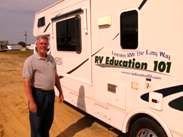I find it odd that while numerous states are reporting state park attendance is up during the recession many parks are getting the ax to shave a few dollars off the state deficit. Something else I see as odd is while state park attendance increases many state budgets to fund the parks continue to decrease, and that some of the most beautiful and historical state parks in the country are closing altogether.
State Parks around the country are closing and state officials are claiming these closures will help fix their already broken budgets. That sounds crazy to me. In my opinion, the end result will more likely be hurting the local economies, dilapidated buildings and grounds, increased vandalism and most important the areas of this country that deserve the most protection and preservation are falling to the wayside. What’s next, to start developing state land and parks into urban community developments to try and fix a broken states economy?
Theodore Roosevelt, one of the greatest conservationists in American history, would be disgusted with many of today’s caretakers of our natural resources. These quotes from Teddy Roosevelt sum it up.
“We have fallen heirs to the most glorious heritage a people ever received, and each one must do his part if we wish to show that the nation is worthy of its good fortune.” ~Theodore Roosevelt
“Of all the questions which can come before this nation, short of the actual preservation of its existence in a great war, there is none which compares in importance with the great central task of leaving this land even a better land for our descendants than it is for us.”~Theodore Roosevelt
From an RV and camping enthusiasts viewpoint I would think that during a serious recession people would choose to take shorter camping trips, closer to home in an effort to still enjoy their favorite pastime, and cut costs at the same time. This would equate to camping at state parks close to home, which in turn increases the state tourism and helps local economies thrive. I see this as a time state officials should embrace their state parks, promoting them as a way to enjoy nature during these tough economic times. So why would state officials want to cut funding and close state parks? I just don’t get it!
Many of these state parks have been open to local residents and outside visitors for generations. Closing them only affects the local economy in the counties where they are located and state tourism in general. If past state park closing history is any indication many of these small surrounding towns will be financially devastated when the parks are closed.
State officials claim that closing state parks will help reduce the deficit, or because of budget cuts they can no longer fund the parks. It really brings to question if these states are budgeting properly in the first place. Why should state parks and local economies take the hit? Why should the taxpayer lose out on the benefits state parks have to offer? I would think if these parks being closed, due to budget woes and funding, were managed and marketed properly they would be profitable to the state rather than costing the state money.
In New York for instance, the governor has recommended a proposal to close 41 parks, 14 historic sites, and service reductions at 23 parks and one historic site. These closures and reductions are supposed to help with the 8.2 billion dollar deficit. I find it sad that in the NY state park systems 125 year history this would be the first time parks would be closed. These same parks didn’t even close during the great depression!
According to an article in The Record, titled “Officials Worry about State Park Closings” other lawmakers in NY disagree with closings, saying closures would produce relatively little in savings, considering the temporary shutdowns of the three state parks in 2009 only produced a savings in the tens of thousands of dollars.
Many other states are using innovative measures in an effort to keep state parks open. Some want counties to have control over parks as opposed to the state. Others want to add a fee on vehicle registration to help fund parks and still others use the lottery and land transfer tax as methods to support state park funding. I applaud the efforts of these states to diligently work on keeping their state parks off of the state budget chopping block.
It is my final thought that elected state officials and state employees have a moral obligation to not only preserve but to protect their historical state parks. I say shame on each and every state official who uses these wonderful recreation and historical landmarks in a misguided attempt to solve state budget issues. The really sad thing is the small amount of money saved from park closures won’t truly help the state deficit problem, but the consequences down the road will surely hurt the local state resident’s lives that elected these officials in the first place.
I hope what is happening at the state level doesn’t evolve to the federal level. Our national parks need to be protected and preserved. President Obamas 2011 budget request for National Park Service is 21.6 million lower than the current 2010 fiscal year budget. The first step is always to cut the funding. In reality the Park Service budget is miniscule compared to the federal budget. It is a little price to pay to be good stewards of this precious land. Here is a link where your voice can be heard, by asking Congress to boost national park funding levels rather than lower them.
http://act.npca.org/campaign/presidents_budget?qp_source=adv%5ffbfund06
As Teddy Roosevelt said, “There is nothing so American as our national parks…. The fundamental idea behind the parks…is that the country belongs to the people, that it is in process of making for the enrichment of the lives of all of us.”
To help keep your state parks open I encourage you to contact the governor’s office, state supervisors and other state officials.
Happy RV Learning,
Mark Polk
RV Education 101
RV University
RV Orientation
Go for the RV Gold
Follow us on FACEBOOK
RV Consumer







No comments:
Post a Comment